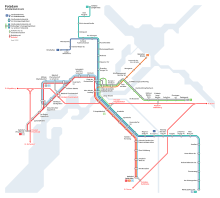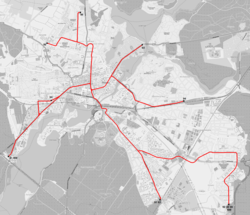| Potsdam tramway network | |||||||||||||||||||||||||
|---|---|---|---|---|---|---|---|---|---|---|---|---|---|---|---|---|---|---|---|---|---|---|---|---|---|
 | |||||||||||||||||||||||||
| Operation | |||||||||||||||||||||||||
| Locale | Potsdam, Brandenburg, Germany | ||||||||||||||||||||||||
| |||||||||||||||||||||||||
| |||||||||||||||||||||||||
The Potsdam tramway network (German: Straßenbahnnetz Potsdam) is a network of tramways forming part of the public transport system in Potsdam, the capital city of the federal state of Brandenburg, Germany.
The network is owned and operated by the public citizen company Verkehrsbetrieb Potsdam [de](ViP), and included in the "Berlin C" fare zone (Tarifbereich Berlin C) of the Verkehrsverbund Berlin-Brandenburg.
History
The network opened on 12 May 1880: It was a horsecar system owned by the society Reymer & Masch, named Potsdamer Straßenbahn-Gesellschaft and consisted of a pair of lines. 1907 saw the introduction of electric trams which ran on a new line of 8 km (5.0 mi). In 1908 the network consisted of 4 lines (named from A to D) and in 1949 of 5 lines (named from 1 to 5).
At the end of the 1950s, new streetcar models were introduced (typical during the DDR era), the Gothawagen (T57, G4-61, G4-65 and T2-62), produced in the Thuringian town of Gotha by the Gothaer Waggonfabrik.
In the 1980s, a pair of new routes were built: in 1984 through the new residential center in Babelsberg and in 1988 from Am Stern stop to the new south-eastern residential area in Drewitz. The Czech trams Tatra KT4 were introduced in 1993, and the modern Combino and Variotram in the 2000s. Some of the Tatra KT4D were given to Ploiești, an industrial city in Romania.
Network



The Potsdam route network is a standard-gauge railway. It is 28.9 kilometres (18.0 mi) long and has 63 stops. The track length is 59.6 kilometres (37.0 mi). It is served by five main and two amplifier lines. It is almost continuously double tracked, only the Nauener Tor is crossed by means of a gauntlet track.
The network consists, as of June 2022, of 7 lines:
| 91 | Bhf. Pirschheide ↔ Bhf. Rehbrücke |
| 92 | Bornstedt, Kirschallee ↔ Schlaatz, Bisamkiez (↔ Kirchsteigfeld, Marie-Juchacz-Straße) to Kirchsteigfeld only Saturday and Sunday |
| 93 | Glienicker Brücke ↔ Bhf. Rehbrücke |
| 94 | (Bhf. Pirschheide ↔) Schloss Charlottenhof ↔ Babelsberg, Fontanestraße |
| 96 | Campus Jungfernsee ↔ Kirchsteigfeld, Marie-Juchacz-Straße |
| 98 | (Schloss Charlottenhof ↔ Bhf. Rehbrücke, Bisamkiez) only Monday to Friday in the rush hour and not in the school holidays |
| 99 | Babelsberg, Fontanestraße ↔ S Hauptbahnhof (↔ Schlaatz, Bisamkiez) from Bisamkiez only in the morning, to Bisamkiez only in the evening |
The tram lines 91 to 96 operate on all days according to a uniform timetable scheme. The basic scheme of the tram lines is a 20-minute-cyclic schedule. The timetable of the tram lines are coordinated at the interchange points Potsdam Hauptbahnhof and Babelsberg station with the Berlin S-Bahn.
Lines 98 is a peak-only line, which operates on school days. On Line 92, extra rides are offered throughout the route in the rush hour. As a result, lines 92 (with 2 courses) and 96 (with one course) run at 6/7/7-minute intervals, which in turn means that line 91 and 92 as well as 96 and 93 serve the transit network at intervals shorter than 10 minutes.
The network is navigated with uni-directional vehicles. There are turning loops at all terminal stops. Exceptions are Glienicker Brücke, which is crossed by a triangular junction, as well as Schloss Charlottenhof, where the tramcars are turned around by a block bypass.
Photogallery
-
 A "Gothawagen" at Platz der Einheit in 1965
A "Gothawagen" at Platz der Einheit in 1965
-
 Historical 1907 Triebwagen Nr. 9 in 2006
Historical 1907 Triebwagen Nr. 9 in 2006
-
A "Tatra KT4" at Schragen
-
 A "Tatra KT4" at Nauener Tor
A "Tatra KT4" at Nauener Tor
-
A "Combino" at Rathaus Babelsberg
-
A "Variotram" used in Duisburg at Platz der Einheit
-
 The final Potsdam version of the new "Variotram"
The final Potsdam version of the new "Variotram"
-
 A rail maintenance vehicle at Platz der Einheit
A rail maintenance vehicle at Platz der Einheit
See also
References
Notes
- "S+U-Schnellbahn Berlin (Tarifbereich ABC)". Berliner Verkehrsbetriebe. 4 August 2019. Retrieved 13 November 2019.
- ^ (in German) Günther Wolf-Dietger, Michael Wolf-Dietger, Machel Wolf-Dietger: "Potsdamer Nahverkehr: Straßenbahn und Obus in Brandenburgs Landeshauptstadt". Geramond-Verlag GmbH, Munich 1999 - ISBN 3-932785-03-7
- "Potsdam Light Rail".
- (in German) Gothawagen in Potsdam
- (in German) History of transport in Potsdam
- "Zahlen und Fakten" (in German). Stadtwerke Potsdam. Archived from the original on 2015-05-27. Retrieved 2015-04-23. Stand 2008
- (in German) Potsdam tram network infos on ViP website
- Note the DVG logo on the vehicle
Bibliography
- Bauer, Gerhard; Kuschinski, Norbert (1995). Die Straßenbahnen in Ostdeutschland [The Tramways in East Germany]. Vol. Band 3: Berlin, Brandenburg, Mecklenburg-Vorpommern . Aachen, Germany: Schweers + Wall. ISBN 3921679818. (in German)
- Schwandl, Robert (2012). Schwandl's Tram Atlas Deutschland (in German and English) (3rd ed.). Berlin: Robert Schwandl Verlag. pp. 116–117. ISBN 9783936573336.
External links
- Stadtwerke (and Verkehrsbetrieb) Potsdam Archived 2017-11-02 at the Wayback Machine (in German)
- Potsdam Tramway (map, infos, pictures) at urbanrail.net
- Tram Travels: Verkehrsbetrieb Potsdam (ViP)
- Article about Potsdam Tramway at railway-technology.com
- Potsdam database / photo gallery and Potsdam tram list at Urban Electric Transit – in various languages, including English.
- Potsdam database / photo gallery at Phototrans – in various languages, including English.
| Baden-Württemberg |   | |
|---|---|---|
| Bavaria | ||
| Berlin | ||
| Brandenburg | ||
| Bremen | ||
| Hesse | ||
| Lower Saxony | ||
| Mecklenburg-Vorpommern | ||
| North Rhine-Westphalia | ||
| Rhineland-Palatinate | ||
| Saarland | Saarbrücken | |
| Saxony | ||
| Saxony-Anhalt | ||
| Thuringia | ||
| Part of Strasbourg tramway network — Part of Basel tramway network — Partly in Berlin | ||
| Urban public transport networks and systems in Germany | |
|---|---|
| S-Bahn | |
| U-Bahn | |
| Stadtbahn | |
| Trams |
|
| Trolleybuses | |
| Suspension monorails | |
| Other | |
| |
